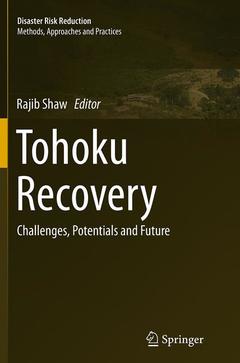Tohoku Recovery, Softcover reprint of the original 1st ed. 2015 Challenges, Potentials and Future Disaster Risk Reduction Series
Coordonnateur : Shaw Rajib

The March 11 disaster in 2011, known as the Great East Japan Earthquake and Tsunami, caused extensive damage in various sectors. Through the recovery process, special lessons are being learned and applied in the affected region. This book attempts to draw lessons from different issues and sectors such as policy perspectives (both national and local), the role of international NGOs, fishing industries and other livelihoods, temporary housing, health, heritage, and lesson sharing. The book outlines the need and approach for sharing the lessons with wider communities in developing those lessons. Based on intensive field research, the book also provides some key lessons from community-based recovery in the affected regions of Iwate, Miyagi, and Fukushima prefectures.
This book has 13 chapters in two parts. The first part of the book, with seven chapters, provides a set of lessons from diverse sectors. The second part, with six chapters, provides case studies from different areas of Tohoku. Six specific issues are addressed in part 1: the role of international agencies, livelihood (namely, fisheries) recovery, temporary housing, health, heritage, and lesson sharing. Part 2 has six case studies from different areas of the Tohoku region, including Fukushima.
The primary target groups for this book are students and researchers in the fields of environment, disaster risk reduction, and recovery studies. The book provides them with a good idea of the current research trends in the field andfurnishes basic knowledge about these vital topics. Another target group comprises practitioners and policy makers, who will be able to apply the knowledge collected here to policy and decision-making.
Tohoku Recovery: Reflections on Some Key Lessons.- Role of International NGO in an unprecedented disaster in Japan.- The Situation and Challenges of Recovery of Fishing Industries in Tohoku region.- Regional Comparison of Temporary Housing Construction Processes after the 20111 Great East Japan Earthquake and Tsunami.- Lessons of Health Sector Recovery on Tohoku disaster.- Temples and Shrines as Contemporary Shelters that Support Evacuees: The Great East Japan Earthquake and Regional Heritage Grounded in the Local Environment.- Sharing lessons from the Great East Japan and Tsunami with the World.- Recovery after Sanriku Tsunamis in 1896 and 1933, and Transition of Housing Location before 2011 Great East Japan Earthquake and Tsunami.- Identifying elements for School Based Recovery and Disaster Resilient Community Building in Japan.- Community Recovery in Tsunami-Affected Area: Lessons from Minami-Kesennuma.- Establishment and sustainability of emergency radio in Tohoku: Implications and Key lessons.- Recovery in Fukushima from integrated disasters.- Impacts of East-Japan’s disaster on production of a small-medium cardboard manufacturer in Fukushima
Rajib Shaw is a Professor in the Graduate School of Global Environmental Studies of Kyoto University, Japan. He worked closely with the local communities, NGOs, governments and international organization, including United Nations, especially in the Asian countries. He is currently the Chair of the United Nations Asia Regional Task Force for Urban Risk Reduction, and the President of Asian University Network of Environment and Disaster Management (AUEDM). His research interests are: community based disaster risk management, climate change adaptation, urban risk management, and disaster and environmental education. He has published several books in the field of disaster and environmental management. He is also the Chief Editor of Asian Journal of Environment and Disaster Management.
Date de parution : 08-2016
Ouvrage de 193 p.
15.5x23.5 cm
Date de parution : 10-2014
Ouvrage de 193 p.
15.5x23.5 cm
